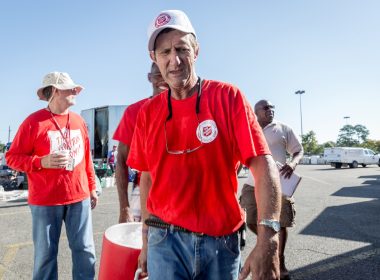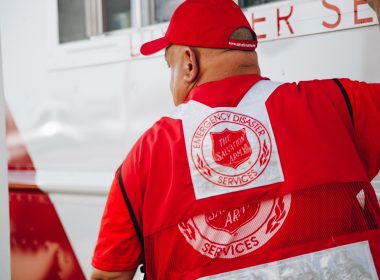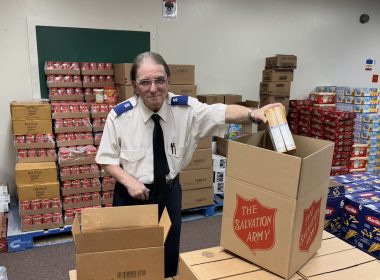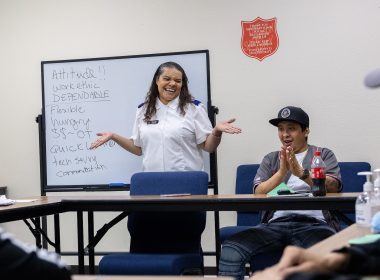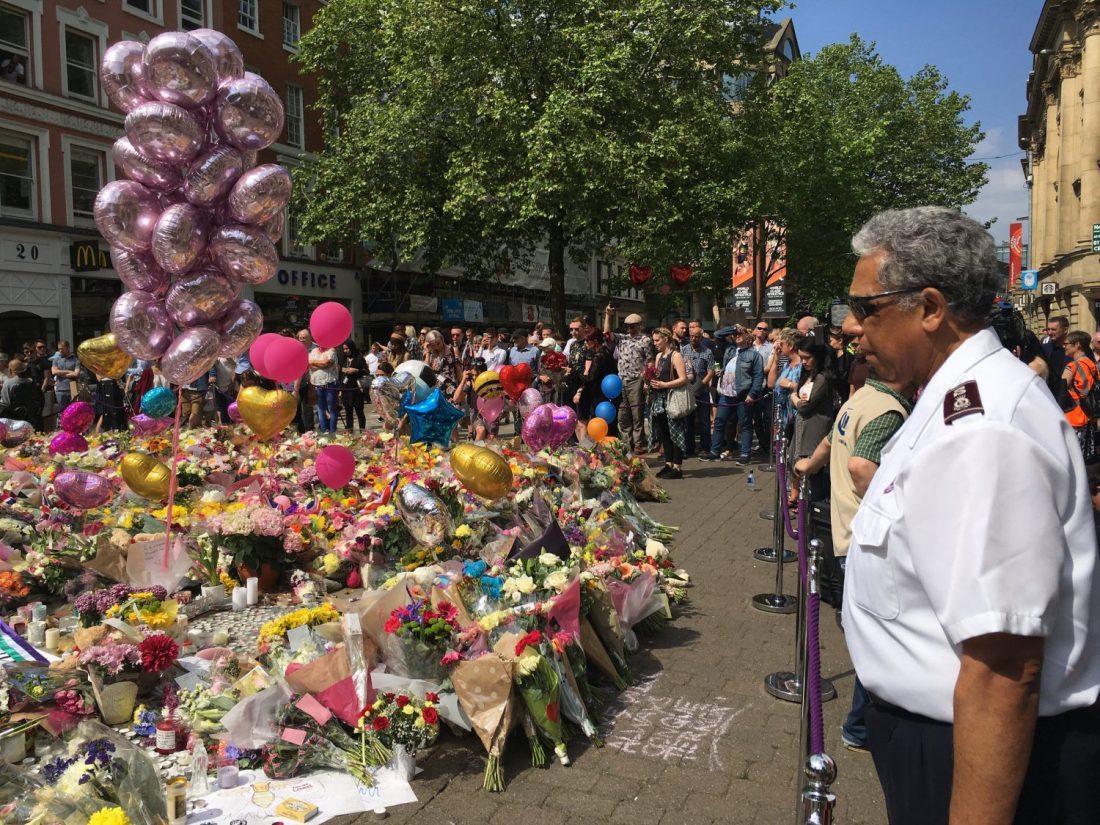
MEDICAL CARE IS provided free of charge by a team of doctors who operate The Salvation Army’s medical clinic. Here, Dr. Caramon, who organized the medical team, ministers to a patient. – photo by Janice Buchanan |
BY JANICE BUCHANAN, LT. COLONEL –
ESTONIA
Majors Wesley and Ruth Sundin
Work in Estonia, on the South Bank of the Gulf of Finland, first commenced in 1927 and continued until 1940 when it was closed due to the Second World War. After the collapse of the Soviet Union, it recommenced in 1995 when three Finnish officers were assigned to start the work in the capitol city of Tallinn. Finland supports the work in Estonia, so it is not considered a grant-aided area.
Warm welcome
Western reinforcement officers Majors Wesley and Ruth Sundin were appointed in August of 2001, as corps officers of the Kopli Corps and to be the first regional officers for Estonia. During a three-year term, they are being challenged to expand the work by opening five new corps and recruiting the first Estonian officers.
How warmly Wes and Ruth welcomed us as we huddled together in their tiny humble flat, which also served as the regional office. We stayed in their home, shared in their work, visited their people, toured all Army facilities, participated in feeding programs, handed out flyers, discussed mutual goals, prayed together, and wept together.
Having now returned home there is yet weekly communication. Once connected, personal involvement becomes ever more compelling. For instance, I vividly recall the day we went to look at a proposed site for developing a homeless shelter and recovery corps for Russians, who once were the privileged class but are now disdained and disenfranchised since the breakdown of the Soviet Union. We stood in the most dismantled rickety shell of a building I had ever seen as a prospect for a Salvation Army facility. But it was here that, with tears streaming down his face, Wes poured out his vision:
To me it’s symbolic. This building is a bunch of rubble; it’s nothing; it’s torn apart, with trash all over the place. But it’s like people’s lives that we want to rebuild. If we can somehow manage this financially, then we can make it into a homeless shelter where people can come and take showers; where they can stay and be safe; where they can hear the gospel and work at removing the rubble in their lives.
We stood together in that appalling place and prayed that it would be so–how blessed we have been to see progress occur quickly.
The Canada and Bermuda Territory, with the endorsement of Commissioner Bill Luttrell, have now funded this building as a project. Negotiations are under way for the Western Territory to send a mission work team to help with the construction process. God is answering prayer and the vision of his servants will soon come to fruition.
Service corps team to Estonia
This summer, we are anticipating being able to send a team of Service Corps workers to Estonia to support the expansion efforts and help with a summer camping program in the countryside. A new regional office, next to the Kopli Corps, has been purchased and soon will be operational. The first accepted candidate for officership has been approved, and plans are underway to appoint additional reinforcement officers. The West can be proud of the Sundins. They are happy, confident, and effective in their leadership of The Salvation Army’s work in Estonia. “Keep praying,” Ruth says, “More miracles are needed.”
EASTERN EUROPE COMMAND
A difficult time of transition
We were privileged to stay in the homes of the regional officers in both Moldova and Ukraine. In each case these leaders were pouring over their budgets, looking for 20% cutbacks. The early years of urgent gathering of resources to recommence Salvation Army work in Eastern Europe have, of necessity, evolved to the inevitable challenge to work toward financial self-support. At the same time, independent governments are struggling to establish viable economies, resulting in more taxes and substantial rises in the cost of living.
Now that The Salvation Army is registered as an official church they are no longer permitted to make purchases from the lower priced street vendors, thus driving up their operational expenses. Audits are conducted to ensure that only “official” receipts have been obtained. What seems like a reasonable adjustment in Salvation Army grant assistance is compounded by these developments.
In spite of concerns about such things as shut off electricity, no hot water, raised rents, and cut budgets General John Gowans, during the congress sessions, challenged the officers and soldiers to use their “God given creativity and imagination” to continue to grow and reach out with the gospel. “Growth has never been a matter of money,” Colonel Kenneth Baillie offered in Officers’ Councils, “It’s the work of the Spirit.” Plans for doubling worship services, adding house churches, and developing local fund-raising enterprises are now being implemented.
Effective Programs
Throughout Eastern Europe there are energetic traditional corps programs. For decades grandmothers have whispered into the ears of the children, “Don’t believe what they tell you at school. There is a God–he loves you.” Now the candle of the Lord is allowed to burn brightly, no longer hidden. Worship services are passionate and uplifting. Ten years ago there were no Salvationists in Russia. No corps. No officers. Today there are five countries that comprise the Eastern Europe Command, 52 corps with numerous outposts, with over 2,000 Salvationists lead by 79 national officers.
There are also much needed social services programs that provide nutritional feeding sites, farm recovery schemes, cooperative efforts for serving orphans, prison work, placement centers for homeless people who have lost limbs because of freezing winters, and wonderful senior drop-in centers where free services literally keep people from becoming homeless.
Most inspiring is to participate in the work of the small medical clinic, with a roving mobile village clinic, based in Chisinau, capitol city of Moldova. The Salvation Army provides the only free medical service in the entire country. Salvationists from Norway have underwritten this program for five years. With the fall of the Soviet systems, many buildings now stand empty–support programs abandoned. Medical treatment is costly and not available to people without resources, especially in the villages. Many professional medical personnel are out of work and forced to turn to any possible source of employment.
But God has raised up Doctor Nickolai Caramon, once a wealthy man, who came to The Salvation Army seeking God and a sense of purpose after the plummet of the medical system. Now, rich in faith, Dr. Caramon has organized a team of doctors who operate the Army’s medical clinic. Thirty Saturdays a year they take their donated, used ambulance to a remote village, providing the only medical services most villagers will receive in an entire year. There is only enough medicine for ten-day prescriptions. Dr Caramon, a Salvation Army soldier, wears his uniform along with his stethoscope and when there is nothing more that can be done, he prays with his clients and gives them over to the Great Physician.
Humanitarian Aide
The Salt Lake City Corps has formed a positive association with the humanitarian directors of the Church of Jesus Christ of Latter Day Saints (LDS) international leaders in that city. This has resulted in a successful shipment of an entire sea container of food, hygiene kits, school kits, and new clothing that was sent to The Salvation Army regional headquarters in Kiev, Ukraine–without having to pay duty. What a joy it was to be able to hand-deliver many of these goods to the various corps and institutions. Major Patricia Froderberg enjoyed closely supervising an orphanage worker as she changed a little baby girl into a brand new pink pajama suit. Over and over again we saw the smiles of those whose lives would be enriched by this effort.
Throughout the touring of Eastern Europe, careful assessments of current needs were noted. As a result, specific medical supplies for Dr. Caramon’s work in Moldova are now being gathered. Seven pallets of medical supplies valued in excess of over $30,000, are already set aside for Ukraine. Clothing and blankets and other supplies will be added and soon a second container will be shipped to support our work in Eastern Europe.
HEART CONNECTION SELF-DENIAL CAMPAIGN
Personal involvement is the underlying principle of the Western Territory’s recently launched Heart Connection campaign that links all commands with a grant-aided territory. When we make World Services our personal business, when we care, as we begin to pray, and get involved miracles do occur. After all, isn’t it a miracle when God motivates our hearts, stirs our creativity, prompts our giving, and moves us to action?
Lt. Colonel Janice Buchanan, territorial secretary for missions, is responsible for the Heart Connection program which links western soldiers with Salvation Army personnel throughout the world. Eastern Europe is the Intermountain Division’s “Heart Connection.”
MAKING WORLD SERVICES OUR PERSONAL BUSINESS
Every Salvationist is responsible to take a personal interest in the ministry, development, growth, and vision of the global missions and missionaries that we sponsor.
This was the impetus for the recent trip to the Finland and Estonia Territory and the Eastern Europe Command planned by Lt. Colonel Janice Buchanan, secretary for missions, and Major Patricia Froderberg, Salt Lake City corps officer, who previously served with her husband as the regional officers of Ukraine. Froderberg took three weeks of vacation and paid her own airfare in order to make the trip–that’s personal involvement!
It has now been ten years since the collapse of the Soviet Union, the return of The Salvation Army to Russia, along with the initiation of Salvation Army ministry in many of the newly independent nations. The trip to Estonia and Eastern Europe was proposed for the purpose of:
- Conducting a current assessment of needs
- Exploring avenues of meaningful support
- Providing encouragement to officers and soldiers
- Responding to the invitation to share in the ten-year celebration of growth at the Eastern Europe Command Congress.

